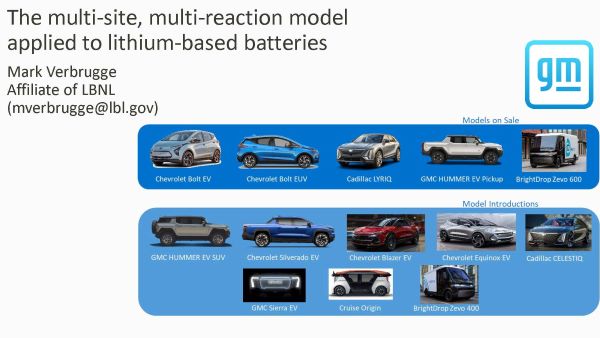"The multi-site, multi-reaction model applied to lithium-based batteries"
"The multi-site, multi-reaction model applied to lithium-based batteries"
Abstract
We overview enabling research for the characterization and design of cells using intercalation and alloy electrodes. Specifically, we have recently developed and implemented a multi-site, multi-reaction (MSMR) model. We shall demonstrate the approach with various chemistries of interest today. We first discuss some of the similarities and differences between the MSMR model and the original Doyle-Fuller-Newman model which we shall refer to as the DFN model, first published in 1993. This model represents an intercalation electrode using porous electrode theory, but it also includes a detailed description of transport of Li ions in the electrolyte, transport of lithium in the solid phase, and the kinetics of the intercalation reaction as a Butler-Volmer equation. The MSMR model is based on the same porous electrode theory used in the original DFN model, and it uses the same treatment of transport in the electrolyte. However, the MSMR model introduces significant changes in the representation of both transport in the solid phase and the kinetics of the intercalation reaction. The main reason for the changes in the MSMR model is because it hypothesizes that intercalated lithium consists of not just one species, but multiple species. There is significant evidence to support this point of view, both from cyclic voltammetry experiments as well as X-ray diffraction analyses. We present results in this talk for experiment-theory comparisons involving about a dozen different lithiated anodes and cathodes. In summary, the MSMR model attempts to give a more accurate representation of solid phase diffusion and a more complete representation of intercalation interfacial kinetics, and, in this context, our hope is that the MSMR model provides a useful complement to the original DFN model.
Speaker
Mark VerbruggeMark Verbrugge started his professional career in 1986 with the General Motors Research Labs after receiving his doctorate in Chemical Engineering from the College of Chemistry at the University of California (Berkeley). In 1996, Mark was awarded a Sloan Fellowship to the Massachusetts Institute of Technology, where he received an MBA. Mark returned from MIT in 1997 to join GM’s Advanced Technology Vehicles (ATV) as Chief Engineer for Energy Management Systems. In 2002, Mark rejoined the GM Research Labs as Director of the Materials and Processes Lab, which maintained global research programs ranging from chemistry, physics, and materials science to the development of structural subsystems and energy storage devices. The Lab was later expanded in scope and became the Chemical and Materials Systems Laboratory.
Mark has published in topic areas associated with electroanalytical methods, polymer electrolytes, advanced batteries and supercapacitors, fuel cells, high-temperature air-to-fuel-ratio sensors, surface coatings, compound semiconductors, and various manufacturing processes related to automotive applications of structural materials; he has about 200 patents, patents pending, and trade secrets associated with these topic areas.
Mark was a Board Member of the United States Automotive Materials Partnership LLC (2002-2023) and the United States Advanced Battery Consortium LLC (1997-2023), and is an adjunct professor for the Department of Physics, University of Windsor, Ontario, Canada. After retiring from GM in 2023, Mark became an Affiliate of Lawrence Berkeley National Laboratory.
Mark’s research efforts resulted in his receiving the Norman Hackerman Young Author Award and the Energy Technology Award from the Electrochemical Society as well as GM internal awards including the John M. Campbell Award for research accomplishments, twice the Charles L. McCuen Award for inventions substantially influencing GM products, and twice the Boss Kettering Award, the highest technical award given by GM. Mark received the Lifetime Achievement Award from the United States Council for Automotive Research, three R&D 100 Awards (2017, 2019, and 2022), and an Edison Award (2023). Mark is a Fellow of the Electrochemical Society and is a member of the National Academy of Engineering.
